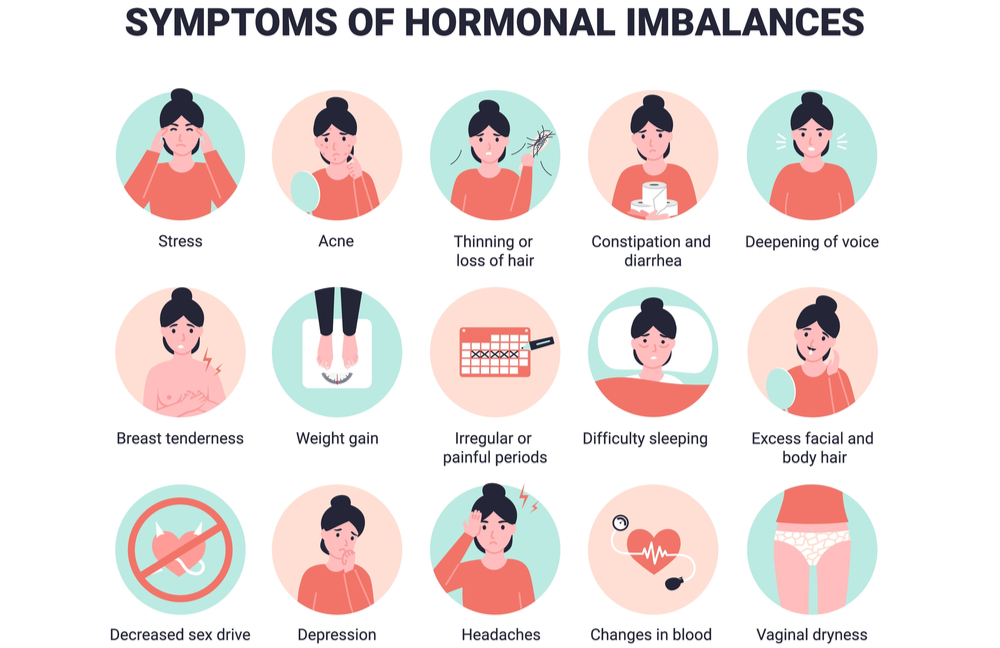Signs Of A Hormone Imbalance in Women


The human body is an absolute miracle. Though we’re really nothing but huge masses of cells, and our DNA is nearly 100% identical from person to person, each one of us is so uniquely ourselves. Every one of us is the result of a unique recipe, the perfect blend, of this much bone and that much sinew. This much blood, with just the right amount of platelets. That much of whatever else makes you, you.
Yes, you are the whole enchilada. Even when your hormones are a bit out of whack.
What Are Hormones?
Hormones are chemicals that are always coursing through your body, keeping your mood in check (or not), and performing a whole host of other actions centered around telegraphing messages throughout your body.
The recipe needed to put you together would not be possible without your hormones. You are the whole enchilada, yes, and enchiladas are enchiladas because of their tangy sauce, of course.
These chemical messengers we call hormones originate in the glands of the endocrine system, and drive many different processes in the body such as early growth and development, pregnancy, sexual function, metabolism, and yes, mood.
Hormones are extremely powerful, and just like any potent sauce, a little dab’ll do ya. Too much or too little of a particular hormone can (and often does) have a heavy impact, so it’s important to be aware of what they do, some of the ways that an imbalance can manifest, and what those signs might mean. (1)
What Do Hormones Do?
Hormones travel throughout the body, directing certain processes and influencing the effectiveness of them. You already know that hormones affect things like early growth, fertility, and mood, but interestingly, hormones are also the reason your arms and legs are the same length. Hormones are how your body can turn the papaya you ate at breakfast into bone, muscle, and whatever things your own body happens to need.
In a perfect world, your brain intuitively knows the exact recipe for making the whole enchilada. Springing into action at the direction of our brain, specific hormones, in exact amounts, seep into the bloodstream from whichever endocrine gland they are stored in. A little of this and a little of that, always running in the background, topping up as needed, fading back where appropriate, our hormones give life to our bones and sinew. They are the sugar and spice, a pinch of everything nice, that makes us, us.
But our hormones aren’t just messengers in and among each other, keeping each other busy with tasks. Hormones can also be messengers directly to us. When it’s all running in the background, according to plan, we don’t notice a thing. That’s the goal. But when something’s feeling “off” with you, there’s a chance it could be a hormone imbalance. Your body might be trying to send you a message. (2)
Signs Of Hormone Imbalance In Women
How do you know if you have a hormone imbalance? Only a diagnosis from a trained professional can tell you for sure, but it’s likely you’ll notice that something is amiss well before you call on them for help. Symptoms can run the gamut from subtle to severe, and affect everything from mood to body hair. You may experience any of the following, or something else entirely:
- heavy, painful, or irregular periods
- osteoporosis, brittle, weak bones
- hot flashes, night sweats
- vaginal dryness
- breast tenderness
- indigestion
- constipation, diarrhea, general digestive upset
- acne associated with menstruation
- uterine bleeding not associated with menstruation
- increased hair growth on the face, chest, neck, or back
- infertility
- weight gain
- thinning hair or loss of hair
- skin tags or abnormal skin growths
- deepening of the voice
- clitoral enlargement (3)
What Does A Hormone Imbalance Mean?
That’s a long and scary list of possible symptoms, and it’s not even all of them. With a hormone imbalance, almost anything can happen. That’s because ultimately we’re talking about glands that aren’t producing the right amount of juice, and the effect that will have, depends a lot on your unique chemistry.
A hormone imbalance could mean you’re pregnant, or it could mean that you’re definitely not pregnant, because menopause has started. Simply put, it means that _____ gland is not producing _____ hormone. Or, that it is producing too much of that hormone. And the result is a symptom, a sign from your body, that it needs help finding some equilibrium.
As you know the endocrine system is responsible for the creation and distribution of hormones throughout the body. Adrenaline is one hormone you’re probably somewhat familiar with; this is released into the bloodstream by the adrenal glands. Ovaries are in charge of the sex hormones, and the pancreas keeps digestion and blood sugar in check. Every gland in the endocrine system has a job to do, and honestly, sometimes a hormone imbalance is normal. Menstruation, pregnancy, and menopause too… those are times when, by definition, hormones are in flux. (3)
What To Do About A Hormone Imbalance?
The most important thing about getting to the bottom of a hormone imbalance, is understanding why it is happening. What is going on, that is causing the symptom(s)? Sometimes there is nothing, or very little, to be done. For example, in the case of a headache caused by hormones from PMS, a couple of aspirin or ibuprofen may be all that is needed to “right the ship”. The nauseated nature of early pregnancy is, in some respects, just the way it is.
But when the symptoms become so severe that your life, and perhaps even your livelihood are affected, it’s time to get to the bottom of “why” so you can address it correctly. Some of the more common conditions that cause hormone imbalances in women include:
- birth control or hormone replacement medications
- polycystic ovary syndrome (PCOS)
- menopause
- primary ovarian insufficiency (POI)
- cancer of the ovaries
Polycystic ovary syndrome, or PCOS, is a very common condition among women of reproductive age. Symptoms vary: irregular or heavy periods are common, but so is thinning hair, acne, and even male pattern baldness. The exact cause of PCOS isn’t known, but several factors can contribute to the issue. One factor is excess insulin, the hormone produced by the pancreas. It’s important to get that under control, not just to stop the symptoms of the hormone imbalance, but because if cells become resistant to insulin, desensitized to it, that will affect blood sugar levels in the long term. (4)
So it’s really important to get to the “why”, and provide support for your body there.
Balance Your Hormones, Balance Your Life
Every condition is different, but in the case of PCOS, it is more severe in those experiencing obesity. PCOS can severely affect ability to conceive, which may or may not be of concern to you. Someone who is obese, might consider weight loss options to bring both imbalances (the weight and the pancreas) into harmony. Someone who is interested in getting pregnant would definitely not want to choose the option of birth control to help manage the hormone imbalance left by PCOS. (5) If you’re someone who wants to balance hormone levels in order to balance weight, click here to learn more about how.
The point is, there is a balance to be found in your own unique body… a way that everything is perfectly in tune. The recipe of how to make you. Your body is always striving for that balance. If it’s having a hard time getting there, it will tell you. Understanding and dealing with a hormone imbalance can be as simple as listening to your body, and doing what it asks. You’ll be back to your sweet and saucy self in no time flat.
Sources:
- https://medlineplus.gov/hormones.html
- https://www.pbs.org/wgbh/pages/frontline/shows/nature/etc/hormones.html
- https://www.medicalnewstoday.com/articles/321486
- https://www.mayoclinic.org/diseases-conditions/pcos/symptoms-causes/syc-20353439
- https://www.mayoclinic.org/diseases-conditions/pcos/diagnosis-treatment/drc-20353443









